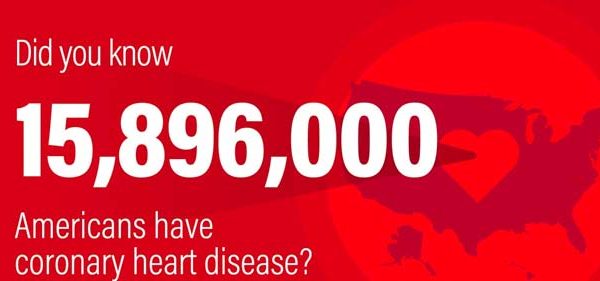Did you know that 1 out of 4 deaths in the United States are caused by heart disease? Coronary heart disease is the leading cause of death for both men and women, killing approximately 370,000 people annually.
Understanding your risk factors for heart disease
Despite the statistics, there’s hope! You could reduce your risk significantly by making certain lifestyle changes. First, you must determine your risk factors. There are two general risk categories that can help determine your risk for heart disease:
Major risk factors that can’t be changed
- Age 65 or older
- Family history – children of parents with heart disease are at higher risk.
- Gender and race – males are at higher risk of heart disease, as well as African-Americans, Mexican-Americans, American Indians, and native Hawaiians.
Major risks that can be controlled
- Smoking
- High blood pressure
- High blood cholesterol
- Physical inactivity
- Being overweight
- Diabetes
- Unhealthy diet, including excessive alcohol consumption
- Stress
- Chronic inflammation
The American Heart Association encourages heart disease prevention as early as possible. A good way to start is to look at how many risk factors you have and work to reduce the number of factors that can be changed.
Of course, increasing your activity level, avoiding smoking, alcohol and junk food can all reduce your risk for heart attack, stroke and other cardiovascular events. However, we’d like to focus on a non-traditional risk factor that is often overlooked – inflammation.
Chronic inflammation can happen for many reasons – poor diet (too much sugar and trans/saturated fats,) food allergies, gum disease, autoimmune disorders, and stress can trigger a chain of reactions in your body that could lead to heart disease. Michael Stone, MD, MS a family physician in Ashland, Ore., discusses in this article how chronic inflammation could cause cholesterol levels to increase. “For example, when chronic inflammation begins to lower testosterone production, Stone says, the body produces more cholesterol (a key precursor to testosterone) to revive the hormone.”
How to reduce chronic inflammation
Often, healthcare providers will order blood work to help determine if there’s inflammation in your body. If there is chronic inflammation in your body, there are several approaches that you should consider:
- Gut health – Having a leaky gut, when the lining of the gut is damaged and fails to regulate what passes or doesn’t pass through to the bloodstream, can cause inflammation. Certain medications, like antibiotics overuse, alcohol and other irritants can cause a leaky gut. Some see a difference in how they feel by doing intermittent fasting, adding gut healing foods like bone broth, and/or adding probiotics and prebiotics to their diets.
- Diet – An integrative healthcare provider can help analyze whether the food that you eat is causing you inflammation through an elimination diet and/or allergy testing. Even if you’re not getting sick or developing a rash, you may still have sensitivities to common allergens like lactose or gluten.
- Focus on an anti-inflammatory diet, free of processed foods, refined carbs and sugars, trans fats, and preservatives.
- Avoid or reduce alcohol intake – it’s known that alcohol consumption increases inflammation in the body, as well as increase triglycerides and create sugar imbalance.
- Supplements – if diet changes alone are not enough, your healthcare provider may recommend certain supplements such as a fiber supplement to help balance blood sugar, Omega 3 fish oil, and/or . Always consult with your provider or one of our pharmacists for the right product and dosage for you.
- Reduce stress level – it is easier said than done, but managing stress is key to prevent and manage most diseases. In fact, stress alone can cause heart attacks. If yoga, meditation, walks, or other common stress-relieving activity doesn’t seem to work, be open to trying new things like aromatherapy, music or sound therapy, or even breathing exercises! What works for others may not work for you!
- Practice good sleep habits – Keeping a dark, cool room, a consistent sleep schedule and staying off electronics in the evening are good ways to help get more restful seep. When our circadian rhythm is off, so is our immune function, and, as a result, our bodies may trigger inflammation. Keep in mind that both too little sleep AND too much sleep can both be harmful. A 2016 study found that sleeping excessively raised levels of inflammatory markers, including C-reactive protein, which is associated with heart disease.
- Avoid environmental toxins – avoid drinking and eating from Styrofoam and plastic, avoid pesticides by eating organic whole foods, avoid smoke (pollution, including cigarrette smoke), and endocrine disrupting chemicals like phthalates.
We hope this information helps you as you work towards improving your heart health. This post is for informational purposes only and does not replace individualized advice by your healthcare provider.
1.CDC, NCHS. Underlying Cause of Death 1999-2013 on CDC WONDER Online Database, released 2015. Data are from the Multiple Cause of Death Files, 1999-2013, as compiled from data provided by the 57 vital statistics jurisdictions through the Vital Statistics Cooperative Program. Accessed Feb. 3, 2015.
2. Yang SN, Hsieh CC, Kuo HF, et al. The effects of environmental toxins on allergic inflammation. Allergy Asthma Immunol Res. 2014;6(6):478-84.
If you’re interested in setting up a consultation, give us a call or email us!



